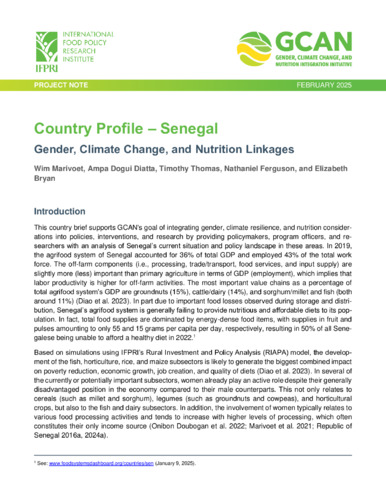A large-scale nutrition- and gender-sensitive poultry market-based program did not improve maternal and child diets in rural Burkina Faso: A cluster-randomized controlled trial
Background
Livestock production interventions can improve consumption of animal-source foods and diet diversity, which may lead to improved micronutrient adequacy.
Objective
We assessed the effectiveness on maternal and child dietary outcomes of SELEVER, a livestock intervention designed to improve diets in rural Burkina Faso through training and market facilitation to improve poultry production; women’s empowerment activities; and nutrition and hygiene behavior change communication.
Methods
For a nonblinded cluster-randomized controlled trial, we randomly assigned 30 communes to SELEVER and 30 communes to control, of which 15 communes served as control for a narrow sample. Fifteen households were randomly selected in two villages per commune; of which 12 were included in the narrow sample. In the wide sample, we used ANCOVA to assess SELEVER’s effectiveness on dietary diversity in index children aged 2-4 years at baseline and in their caregivers, and on minimum acceptable diet in their siblings aged 6-23 months at measurement. In the narrow sample, we used difference-in-difference to assess SELEVER’s effectiveness on vitamin A, iron, and zinc prevalence of adequate intakes (PA) and mean PA of 11 micronutrients in index children and caregivers.
Results
We enrolled 1,767 index children, 1,766 caregivers and 412 siblings aged 6–23 months at endline in the wide sample, and 1,054 caregiver-child dyads in the narrow sample. In the wide sample, exposure to program activities was higher but moderate in SELEVER communities, with limited effects on dietary knowledge and practices and no effects on diet outcomes. The narrow sample showed a negative effect on zinc PA in children (-26 percentage points, P=0.020), and no effect on other outcomes.
Conclusions
A program focused on improving the productivity of and demand for nutritious foods did not improve micronutrient adequacy. Implementation strategy and bottlenecks may have limited the system transformations needed to produce measurable shifts toward healthier diets.
The study was registered on the ISCRCTN registry (ISRCTN16686478); details are available at https://www.isrctn.com/ISRCTN16686478
Authors
Becquey, Elodie; Diop, Loty; Diatta, Ampa D.; Pedehombga, Abdoulaye; Awonon, Josue; Ganaba, Rasmane; Gelli, Aulo
Citation
Becquey, Elodie; Diop, Loty; Diatta, Ampa D.; Pedehombga, Abdoulaye; Awonon, Josue; Ganaba, Rasmane; and Gelli, Aulo. 2025. A large-scale nutrition- and gender-sensitive poultry market-based program did not improve maternal and child diets in rural Burkina Faso: A cluster-randomized controlled trial. Journal of Nutrition. Article in press. First published online May 3, 2025. https://doi.org/10.1016/j.tjnut.2025.04.027
Country/Region
Burkina Faso
Keywords
Africa; Western Africa; Sub-saharan Africa; Children; Dietary Diversity; Poultry; Rural Areas; Trace Elements
Project
Agriculture for Nutrition and Health
Record type
Journal Article







